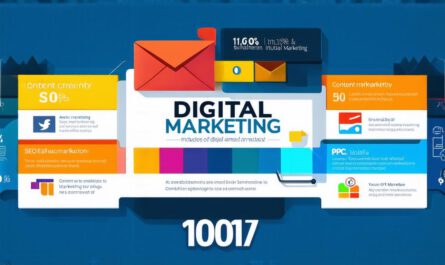Digital marketing has become an essential tool for businesses looking to reach and engage with their target audience online. However, it’s no secret that digital marketing can be challenging, especially for those who are new to the field. In this article, we will explore some of the common challenges of digital marketing and provide tips for success in this complex and ever-evolving industry.
One of the biggest challenges of digital marketing is keeping up with technology and trends. The field is constantly evolving, with new platforms, tools, and algorithms being introduced on a regular basis. It can be difficult for marketers to keep track of all these changes and adapt their strategies accordingly. To succeed in digital marketing, it’s important to stay informed about the latest developments and technologies, and to be willing to adapt your approach as needed.
This includes staying up-to-date with the latest trends in social media, search engines, and other online platforms.
Another challenge of digital marketing is identifying and reaching your target audience effectively. With so much competition for attention online, it can be difficult to stand out and reach the right people.
To be successful in digital marketing, it’s important to have a clear understanding of your target audience and what motivates them. This includes factors such as age, interests, location, and behavior. By using tools like Google Analytics and social media analytics, you can gain insights into your audience and tailor your marketing efforts accordingly.
It’s also important to use targeted advertising and content that speaks directly to your target audience.
Creating high-quality, engaging content is another key challenge of digital marketing. With so much competition for attention online, it’s important to stand out and provide value to your audience.
This includes creating content that is informative, entertaining, and visually appealing. To be successful in digital marketing, it’s important to invest time and resources into creating high-quality content that resonates with your target audience. This includes using a mix of formats such as blog posts, videos, infographics, and social media posts.
Measuring the success of your digital marketing efforts can be another challenge. With so many different metrics and tools available, it can be difficult to know what is working and what isn’t.
To be successful in digital marketing, it’s important to set clear goals and track your progress regularly. This includes using tools like Google Analytics to monitor website traffic, social media analytics to track engagement, and A/B testing to optimize your campaigns. It’s also important to measure the ROI (return on investment) of your digital marketing efforts and make adjustments as needed.
Building a team with the right mix of skills and experience is another key aspect of digital marketing success. Digital marketing requires a diverse range of skills and expertise, from content creation and SEO to data analysis and advertising.
To be successful in digital marketing, it’s important to build a team with the right mix of skills and experience. This may include hiring freelancers or contractors, as well as investing in training and development for your existing team members.
Staying up-to-date with regulations is also an important aspect of digital marketing success. Digital marketing is subject to a range of regulations and guidelines, from data privacy and security to advertising and content regulations.

To be successful in digital marketing, it’s important to stay up to date with these regulations and ensure that your campaigns comply with all relevant laws and guidelines. This includes obtaining necessary permissions and approvals, as well as ensuring that your content is accurate and truthful.
Finally, adapting to changes in the market is another key challenge of digital marketing success. Consumer behavior is constantly evolving, and what worked yesterday may not work tomorrow.
To be successful in digital marketing, it’s important to be flexible and adapt your approach as needed. This includes monitoring industry trends and staying up to date with new developments in technology and marketing strategies. It also includes testing and optimizing your campaigns regularly to ensure that they are performing at their best.
In conclusion, digital marketing can be challenging, but with the right approach and mindset, it can also be incredibly rewarding. By staying informed about the latest technologies and trends, understanding your target audience, creating effective content, measuring success, building a team, staying up-to-date with regulations, and adapting to changes in the market, you can overcome the challenges of digital marketing and achieve success. It’s important to remember that digital marketing is an ever-evolving field, so it’s important to be constantly learning and improving your skills to stay ahead of the game.

